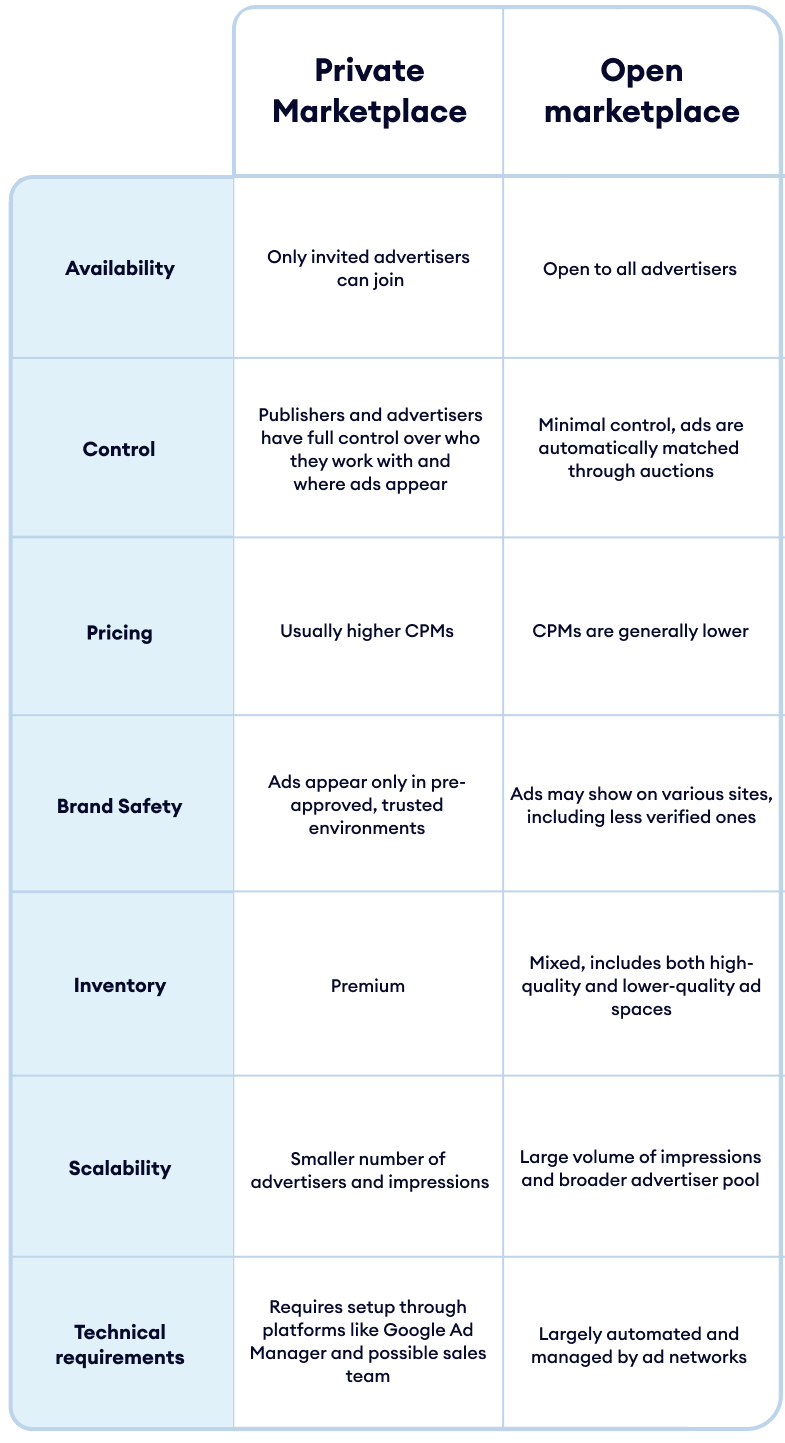
Programmatic offers various monetization functions that allow publishers to squeeze the best of their content. The wide range of programmatic possibilities includes various types of auctions, acquiring new advertisers, and even diversity in methods of selling ad inventory. But what are the most popular programmatic features, and how do they work? Let’s take a closer look at the most popular auction types – private marketplace (PMP) and open marketplace (OMP).
What is open marketplace?
The open market (open exchange) offers the most often used type of open auction. It’s based on real-time bidding (RTB), meaning an automated auction process leaning on the instant, real-time per-impression purchase of ads. An essential advantage of this kind of bidding is that many advertisers can join and fight against each other in that “battle”. Generally, publishers exhibit their ad inventory to the public, so advertisers can bid over it, starting from a minimal cost per mille (CPM) – which is a price for a thousand impressions. The one offering with the most attractive price will win the auction and make a deal in the end.
What is a PMP programmatic?
The private marketplace is very similar to the open market. It’s also a subset of real-time bidding, but publishers limit the number of advertisers allowed to enter the auction, making it private. Due to that, chosen advertisers prioritize bidding, so the process in this type of auction is way more controlled compared to the traditional open market. Before an advertiser enters a private auction, he has to receive approval from the publisher to participate in the bidding. Like the open market, the auction starts after setting a floor price – a minimal CPM, allowing advertisers to enter. And again, the one proposing the highest price will get ad impressions and make a deal.

As you can see, both auction types are very similar but significantly differ in the most strategic point – ad inventory availability. Due to this discrepancy, these types are often used interchangeably for the sake of monetization efficiency. To get down to specifics, I prepared a list of each deal type’s pros and cons, so you can compare them and draw your own conclusions.
Open marketplace’s pros and cons
Pros
- Universal – it’s for small, medium, and larger publishers. Each can take part in auctions as, due to small (or lack) of requirements, it’s open for everyone;
- Attractive ad inventory opens up an unlimited number of possibilities – many advertisers compete for the impressions and offer you higher chances to get a satisfactory deal in the end;
- A publisher doesn’t have to lift a finger – it’s an “everything-handed” kind of deal. Your ad inventory sells itself, and you don’t have to do anything. Isn’t it great?;
- You can sell each ad inventory – this type of deal allows you to sell any kind of impression. Premium or not, it doesn’t matter – you will sell (almost) everything!;
- Transparency – ad systems check who they cooperate with, so there is a low chance of fraud. If you cooperate with a trustworthy company, you don’t have to worry about displaying inappropriate ads on your website. A partner that offers you programmatic advertising solutions will likely provide you with only valid partners from verified sources.
Cons
- No deal guarantee – may happen when your floor price is too high, or your ad inventory is not relevant for the available demand partners. That’s why publishers should always very carefully consider the value of their inventory and compare it to the competition before introducing it to the market;
- Fewer competitors mean lower prices – if there is not so much interest in your ad inventory, it will inevitably result in lower prices. That’s the law of economics which is valid in every business, small demand always leads to lesser rates.
So, now you know the pros and cons of OMP programmatic, but have you ever wondered how advertisers acknowledge that they purchase inventories from a publisher according to the desired terms? That’s where the idea of Deal ID comes in. Thanks to using Deal IDs, sellers and buyers can trade impressions in a predetermined manner via most of the programmatic auctions. How exactly Deal ID helps publishers and advertisers in PMP? Let’s find out!
What is a Deal ID?
A Deal ID or Deal Identifier consists of a unique 19-character number generated by a publisher’s ad server or Supply-Side Platform for facilitating Programmatic Direct deals (including PMP deals). The details of the deal are predetermined by the parties (publisher and advertiser) long before Deal ID creation. After generating ID for the very first time, it is passed through the system together with a bid query, and as a result, it enables DSP platforms to recognize a particular deal. Thanks to it, the right ID may be found. Thus, a proper bidding process according to precondition standards may start. The Deal ID, therefore, enables a one-to-one relationship in automated contracts, where advertisers can access premium inventory on pre-agreed terms and conditions.
Private marketplace’s pros and cons
Pros
- Premium exchanges only – due to excluding some advertisers from bidding, the ones who are left are only selected ones. They offer much higher standards and consequently higher CPM prices. In general, private marketplaces are particularly well-suited for premium campaigns, where brand safety plays a key role. For instance, businesses in sectors such as finance, healthcare, or luxury products prefer that their ads not be placed on random sites. PMPs allow them to specify exactly where their ads will be placed, ensuring that the brand remains protected;
- Selling efficiency – although the private marketplace requires a bit more engagement in the process, it’s still fully automized. Thus, the whole process of selling is highly effective while the publisher does nothing but waits for results. The level of automatization, when it comes to both SSPs and DSPs, is similar to open market, with the difference that PMP gives higher standards and more premium offerings;
- Partnerships possibilities – with a smaller number of advertisers give you a chance to get to know your partners. Thanks to that, not only can you feel a lot more secure while making deals, but also create better relationships with them;
- Better inventory control – PMP deals give publishers more flexibility and control over how they want to sell their inventory, and on what terms. For instance, you might decide that you don’t want to sell your above-the-fold (ATF) inventory on the open exchange, and instead, select buyers to access it at a set price. PMP deals allow you to do that;
- A PMP can be a smart choice whenever precise control over your ad inventory is needed. For instance, if your site focuses on topics like finance, healthcare, or luxury products, you may want to ensure that ads are always contextually appropriate and from trusted brands.
Cons
- Running a Private Marketplace (PMP) is generally more technically and organizationally demanding. PMPs often require a sales team to negotiate deals, manage relationships, and ensure campaigns align with your audience and content. But also requires platforms like Google Ad Manager to set up private deals, manage inventory, and more. It’s a bit more complicated, but if you cooperate with a company such as optAd360, this point doesn’t apply to you – we will do this for you!;
- Better to know the ropes of the business – PMP is dedicated to medium-sized publishers who are connected to programmatic for a while now;
- One notable drawback of PMP is the potentially lower fill rates compared to open exchanges, as there may not be as many advertisers bidding on your ad space. Also, from advertisers’ perspective – they might not reach as many people as they would in an open marketplace, but the people they do reach are often more relevant;
- Better work on your reputation – advertisers willing to pay more for the deals also have more significant expectations and want to trust their partners. Let’s be honest, if you are ready to pay more for a new pair of good quality shoes, you would rather buy them in a well-known brand than in a brand-new startup. The same applies to purchasing ad inventory – publishers have to work on their opinion to gain advertisers’ trust.

So, if you are looking for a solution offering the most significant advertising diversity – the open market is for you. This type of auction is perfect for all publishers who demand fully automated processes, so they don’t have to deal with system complexity right from the start. Alternatively, if you want to work according to higher standards and reach premium advertisers – you should definitely consider a private marketplace:

Good news to end with!
So, now you know the ins and outs of PMP and OMP. With that in mind, you are ready to make an informed decision about what to do next for your website earnings to flourish. You may be interested in cooperation with an Ad Experience Vendor company to take your first steps in monetization. The programmatic technology that they offer chooses deals perfect for you at the moment, so you can sit there and just wait for your profits! Ad Experience Vendors assign auctions tailored to your needs and requirements, juggling between PMP and OMP and using them interchangeably, so you get the best results possible. We believe both ways are profitable, but have to be used wisely and according to the current situation. If you cooperate with optAd360, you shall not worry about anything – relax, get a cup of coffee, and watch us doing monetization magic for you!

